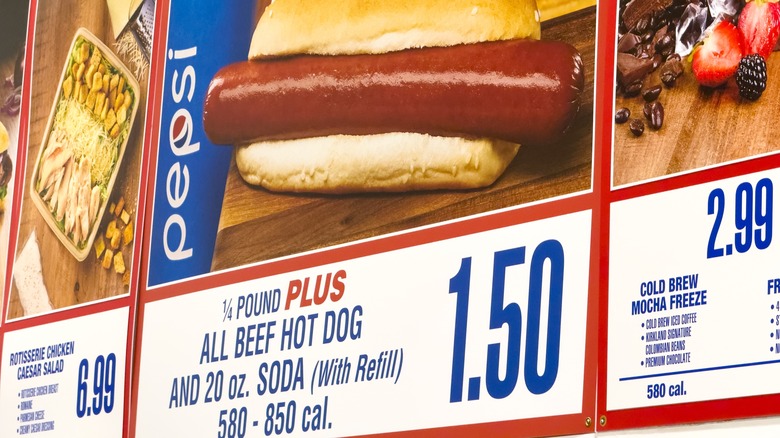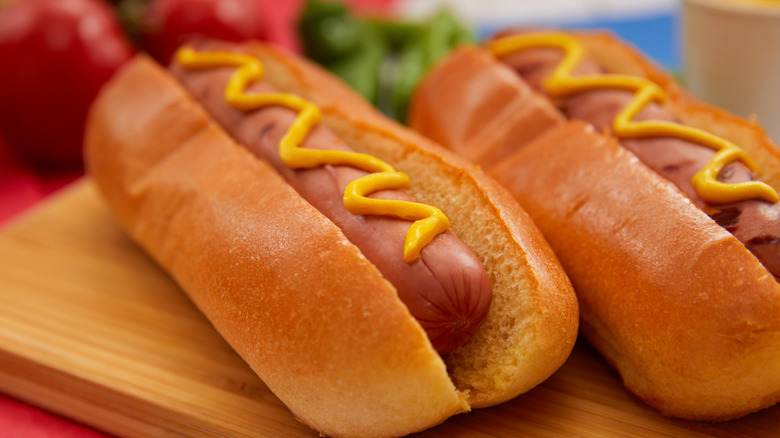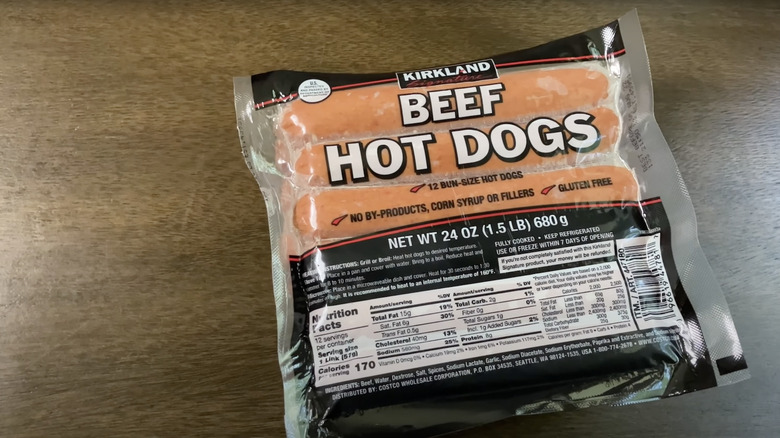How Is It That Costco's Hot Dogs Are Still Only $1.50?
In 1985, a gallon of milk cost $2.20, a loaf of bread sold for $0.99, and a Costco hot dog went for $1.50. Fast forward four decades and the price of a gallon of milk today is about $4. A loaf bread averages $2.54. And a Costco hot dog? It's still selling for $1.50. That's not an oversight. It's a strategy. But it didn't start out that way. The brand's now ubiquitous hot-dog-and-soda combo deal started as a whim in 1984 when managers at a San Diego Costco location welcomed Hebrew National to set up a food cart outside the store. The $1.50 price tag included a ¼-pound pup and a 12-ounce soft drink.
Fast forward 40 years and the deal is still available, but contrary to the unfortunate trend of shrinkflation — that's when the price stays the same, but the product keeps getting smaller — it's actually gotten better. These days, the hot dog is 10% bigger, and it comes with a 20-ounce beverage.
While the deal stands, there has been one major change. In 2009, Costco switched from selling Hebrew National hot dogs to making its own Kirkland-brand signature franks. Why? That's where the story gets interesting.
Straight from the source's mouth
Back in 2018, a reporter for Seattle-based business lifestyle magazine 425 Business attended a luncheon hosted by a local chamber of commerce. Former Costco CEO Craig Jelinek, who retired at the end of 2023, was the keynote speaker. The reporter got a scoop that's been making the rounds on social media ever since. According to the article, Jelinik was an "unimposing and loquacious" speaker who good-naturedly shared a full range of data and statics punctuated by an occasional anecdote — including full details about the time he suggested upping the price on the beloved hot dog-combo deal. Sometime in the late aughts, Jelinek, who was COO at the time, approached then-CEO Jim Sinegal with his idea. "Jim, we can't sell this hot dog for a buck fifty," Jelinik told the crowd. "We are losing our rear ends."
Sinegal's response, as reported in 425 Business, was "If you raise the effing hot dog, I will kill you. Figure it out." Needless to say, Jelinek got the message. Although he firmly believed no one would bat an eye at an increase to $1.75, he took the challenge to heart. The solution? Costco parted ways with Hebrew National and created its own signature Kirkland brand of hot dogs. The work-around involved building dog-manufacturing plants from the ground up, but the return on investment was worth the effort. "We keep it at $1.50 and make enough money to get a fair return," Jelinek told his audience.
More than one way to make a buck
It's not all about the money. We don't know exactly what kind of profit Costco is, or isn't, making on its hot dog-combo deal, but could developing the Kirkland brand truly offset the company's commitment to maintaining the 1984 price for four decades? Probably not, but there is a bigger scheme at play here. A well-known strategy in the world of consumer sales, it's called loss-leader pricing. In a nutshell, loss-leader pricing espouses selling a popular item at a price below market value. The retailer may lose money on that one product, but the goal is to draw consumers away from competitors that may be selling similar merchandise. It's a simple, but highly effective, strategy. The seller offering the deal gives away something at cost — or even at a loss — but the income generated by the come-hither deal far outweighs the investment. It's a strategy Costco applies to its ever-popular rotisserie chickens, too.
In early 2024, an off-hand comment by Costco's longtime CFO, Richard Galanti, stirred fear in the hearts of loyal Costco customers. When asked during an interview about the Kirkland hot dog-combo deal, Galanti, who was retiring after 40 years on the job, told Bloomberg, "It's probably safe for a while." A few days later, Galanti's successor, Gary Millerchip, set the record straight, telling shareholders during a quarterly meeting, per NPR, "To clear up some recent media speculation, I also want to confirm the $1.50 hot dog price is safe."


